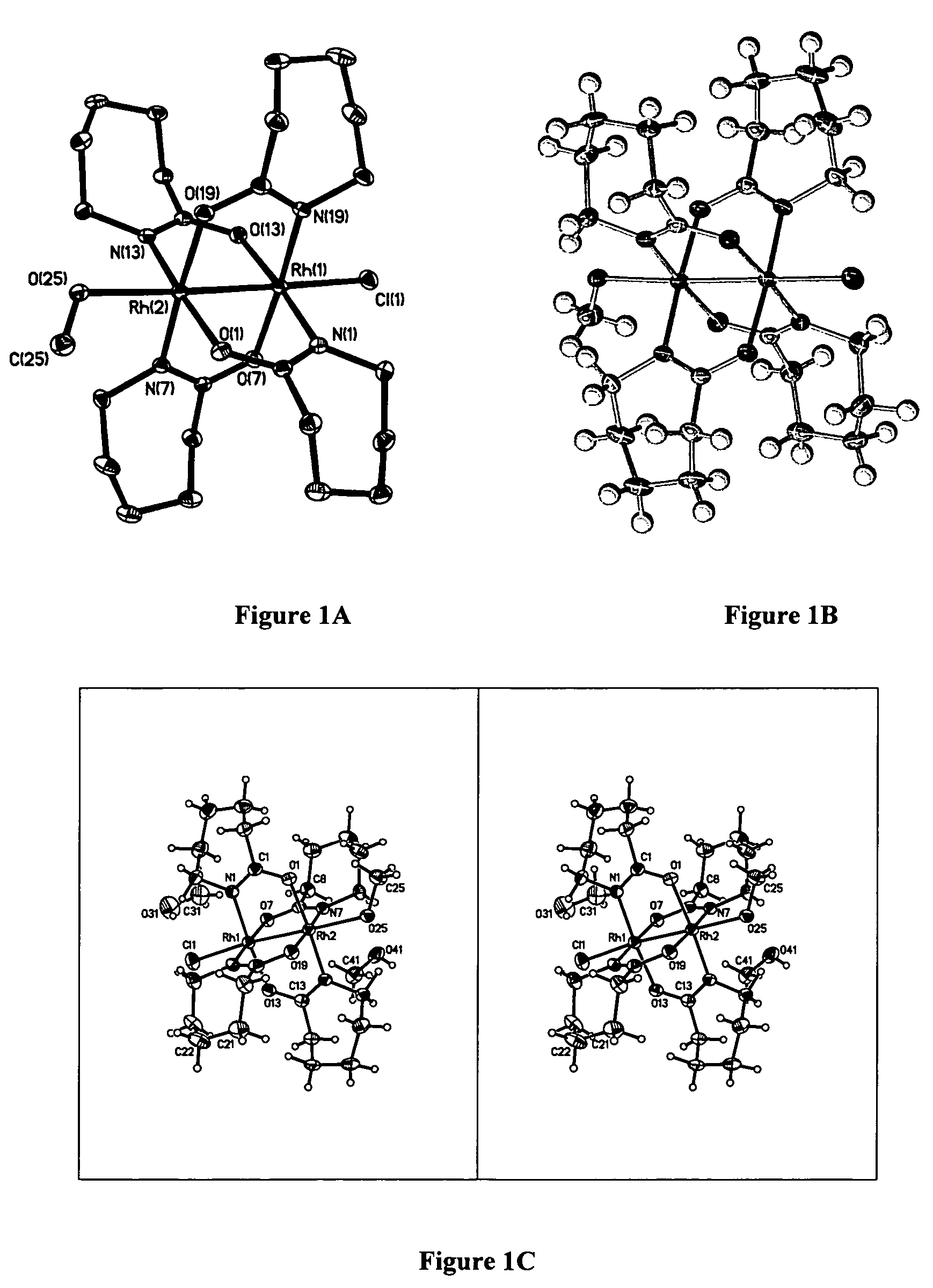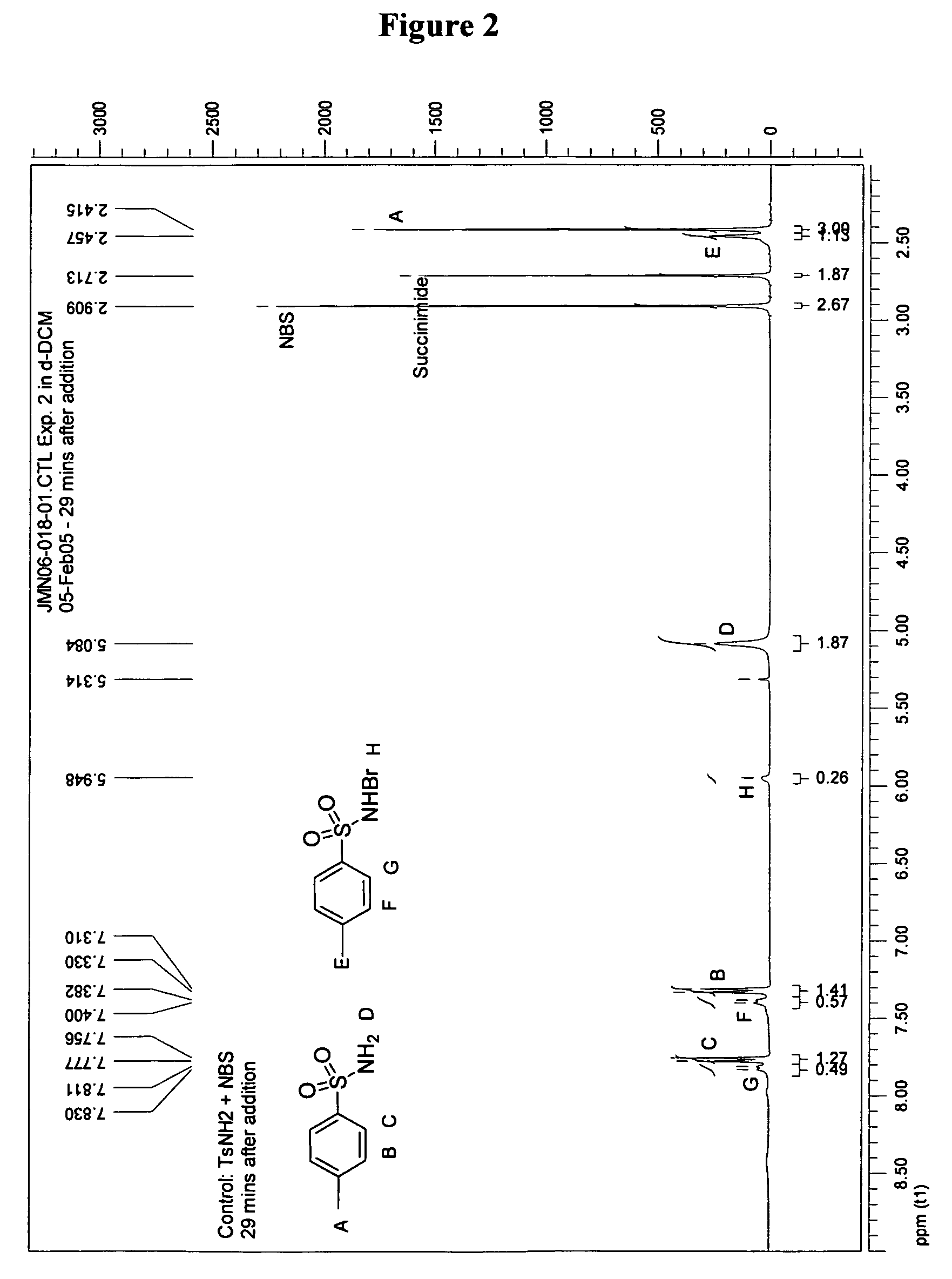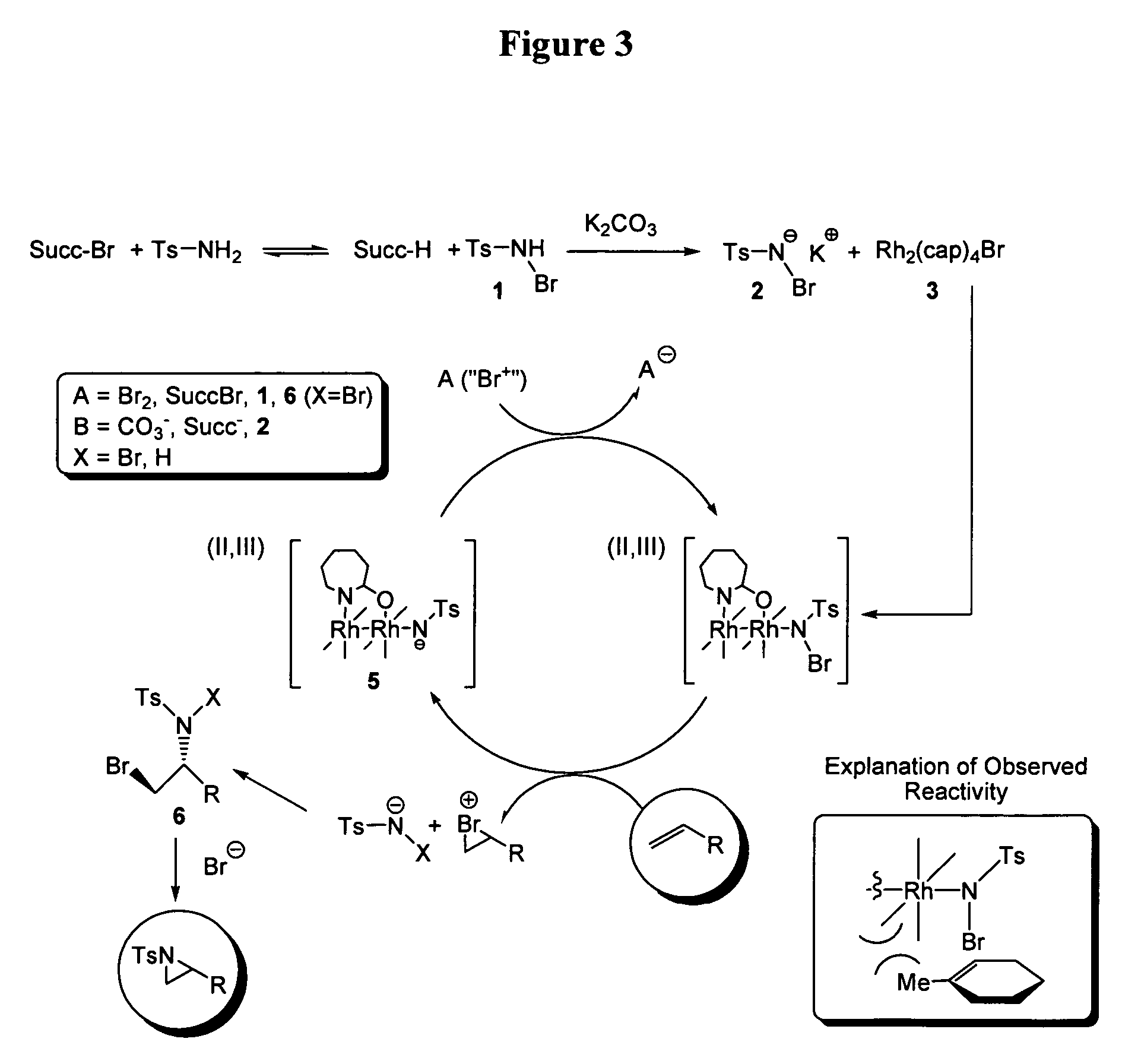Efficient aziridination of olefins catalyzed by dirhodium catalysts
a technology of dirhodium catalyst and olefin, which is applied in the field of organic molecules to achieve the efficient aziridination. it can solve the problems of high catalyst loading, limited shelf life of tsn=iph, and limited methods for direct preparation of aziridines. it can achieve mild, efficient, selective, and selective effects
- Summary
- Abstract
- Description
- Claims
- Application Information
AI Technical Summary
Benefits of technology
Problems solved by technology
Method used
Image
Examples
example 1
Efficient Aziridination of Olefins Catalyzed by Mixed Valent Dirhodium(II,III) Caprolactamate
[0080]General. All reagents were commercially obtained unless otherwise noted. Yields reported are for isolated yields. All products were characterized and in agreement with those previously reported (see, Evans, D. A. et al. (1994) “DEVELOPMENT OF THE COPPER-CATALYZED OLEFIN AZIRIDINATION REACTION,”“J. Am. Chem. Soc. 116:2742-2753; Jeong, J. U. et al. (1998) “BROMINE-CATALYZED AZIRIDINATION OF OLEFINS. A RARE EXAMPLE OF ATOM-TRANSFER REDOX CATALYSIS BY A MAIN GROUP ELEMENT,” J. Am. Chem. Soc. 1998, 120(27): 6844-6845; Cui, Y. et al. (2003) “EFFICIENT AZIRIDINATION OF OLEFINS CATALYZED BY A UNIQUE DISILVER(I) COMPOUND,” J. Am. Chem. Soc. 125(52):16202-16203; Dauban, P. et al. (2000) “SYNTHRESIS OF CYCLIC SULFONAMIDES VIA INTRAMOLECULAR COPPER-CATALYZED REACTION OF UNSATURATED IMINOIODINANES,” Org. Lett. 2(15):2327-2329).
[0081]NBS was recrystallized from water according to the guidelines of A...
example 2
NMR Experiments
[0083]Control Experiment: NMR analysis was performed 29 minutes after addition of 0.5 mL (0.152 mmol) of a 3.03×10−1 M solution of p-toluenesulfonarnide in d-DCM to 0.5 mL (0.149 mmol) of a 2.98×10−1 M solution of N-bromosuccinimide. N-bromo-p-toluenesulfonamide was observed as the product in this equilibrium mixture. Data: 1H NMR (400 MHz) δ 7.81-7.83 (d, J=8.0 Hz, 2H), 7.40-7.38 (d, J=8.0 Hz, 2H), 5.95 (s, 1H), 2.46 (s, 3H); at 29 minutes: CH3(TsNH2):CH3(TsNHBr)=2.7:1.0; at 20 hours: CH3(TsNH2):CH3(TsNHBr)=2.9:1.0. Addition of 100 μL of D2O exchanged protons in the δ 5.95 (s, 1H, —SO2BrN—H) and 5.08 (s, 2H, —SO2NH2) as indicated by loss of signal.
[0084]Equilibrium Experiment: A series of 100 μL aliquots of a succinimide solution (1.52×10−1 M in d-dichloromethane) was added to an NMR tube with N-bromosuccinimide (1.5×10−1 mmol) and p-toluenesulfonarnide (1.5×10−1 mmol) in 1 mL of d-dichloromethane. The ratio of —CH3 substituents is shown in Table 2.
[0085]
TABLE 2Sampl...
example 3
X-Ray Data
[0095]In order to determine the x-ray crystallographic structure of compound 2, a reddish-orange plate with approximate orthogonal dimensions 0.306×0.124×0.018 mm3 was placed and optically centered on the Bruker SMART CCD system at −100° C. The initial unit cell was indexed using a least-squares analysis of a random set of reflections collected from three series of 0.3° wide ω-scans, 10 seconds per frame, and 25 frames per series that were well distributed in reciprocal space. Data frames were collected [MoKα] with 0.3° wide ω-scans, 40 seconds per frame and 606 frames per series. Five complete series were collected at varying Φ angles (Φ=0°, 72°, 144°, 216°, 288°). The crystal to detector distance was 4.893 cm, thus providing a nearly complete sphere of data to 2θmax=55.1320 . A total of 25,387 reflections were collected and corrected for Lorentz and polarization effects and absorption using Blessing's method as incorporated into the program SADABS (Blessing, R. H. (1995)...
PUM
| Property | Measurement | Unit |
|---|---|---|
| pKa | aaaaa | aaaaa |
| mol % | aaaaa | aaaaa |
| mol % | aaaaa | aaaaa |
Abstract
Description
Claims
Application Information
 Login to View More
Login to View More - R&D
- Intellectual Property
- Life Sciences
- Materials
- Tech Scout
- Unparalleled Data Quality
- Higher Quality Content
- 60% Fewer Hallucinations
Browse by: Latest US Patents, China's latest patents, Technical Efficacy Thesaurus, Application Domain, Technology Topic, Popular Technical Reports.
© 2025 PatSnap. All rights reserved.Legal|Privacy policy|Modern Slavery Act Transparency Statement|Sitemap|About US| Contact US: help@patsnap.com



